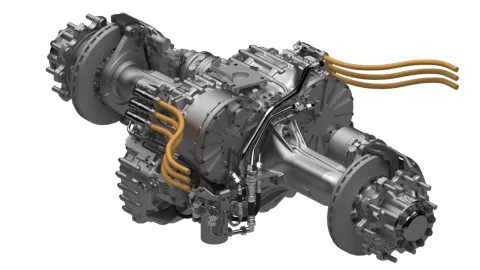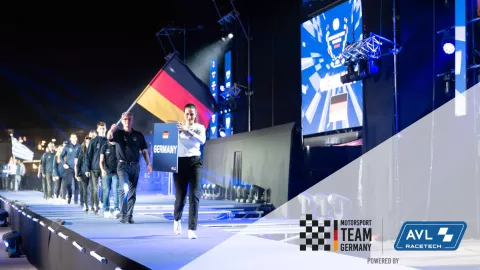AI Innovations for Safe Autonomous Driving

Politicians and industry discuss the opportunities for Berlin as a German automotive centre
Berlin, 07.10.2024 - Generative AI will fundamentally change and accelerate the further development of autonomous driving. Used correctly, it can literally take previous technological advances to a new level: In line with the safety requirements of the German automotive industry, the use of generative AI will enable the development of safe, highly automated driving functions in any traffic context. The next steps towards fully automated (level 4) and ultimately driverless autonomous driving (level 5) are therefore within reach.
High-level event at the Federal Ministry for Economic Affairs and Climate Protection
How exactly this should happen and why now is the right time for it was the subject of an economic policy discussion panel organised by the Federal Ministry for Economic Affairs and Climate Protection (BMWK). Federal Minister Robert Habeck discussed the innovative strength of Germany's leading industry in the promising areas of AI and autonomous driving with nine high-ranking figures from the automotive industry. The focus of the 60-minute debate with the industry's development directors - Mercedes-Benz CTO Markus Schäfer, Continental Automotive CTO Gilles Mabire, Bosch Mobility CTO Dr Mathias Pillin, Valeo Germany CEO Holger Schwab, AVL EVP Jens Poggenburg and BIT TS Managing Director Cornelia Denk - the VDA's Managing Director Dr Markus Schäfer, the VDA's Chief Technology Officer Dr Gilles Mabire, the VDA's Chief Technology Officer Dr Mathias Pillin, Valeo Germany CEO Holger Schwab, AVL EVP Jens Poggenburg and BIT TS Managing Director Cornelia Denk.
Marcus Bollig and the Chair of the Board of Directors of Forschungszentrum Jülich, Prof. Dr Astrid Lambrecht, focused on the opportunities for Germany's flagship industry, which is in the midst of the challenging transformation to electromobility and software-based vehicles.
Generative AI and autonomous driving: nxtAIM research project breaks new ground
The ability of a vehicle to perceive its surroundings, predict how a traffic situation will develop and then navigate safely is largely based on machine learning and artificial intelligence methods. However, the training of autonomous driving functions requires not only large amounts of data, but above all driving data from traffic scenarios that are critical and relevant to safety. In the past, such data collection was associated with high costs and was timeconsuming and labour- intensive. The result today is narrowly defined operating environments (Operational Design Domain (ODD)) that are associated with restricted vehicle speeds, weather conditions and times of day.
This is due to the linear system architectures and discriminative machine learning methods used today. Necessary development progress, particularly in terms of scalability (keyword: data, costs, computing capacities), transferability (keyword: expansion of the operating environment (ODD)) and traceability (keyword: security and acceptance), is therefore only possible step by step. In the nxtAIM project, generative AI models form the basis for research. Linear system architectures can finally be supplemented by the previously missing feedback paths in machine learning processes. In this way, foundation models for driving data can be created that meet the high requirements for safe autonomous driving. Given sufficient computing power, generative AI methods can be scaled and trained relatively easily on huge data sets without any specific functional reference. They can be used in the field of perception, for generating sensor data, predicting the behaviour of road users and for route planning. In function development, the industry is therefore no longer limited by the amount of real driving data; instead, new traffic and driving data can be generated synthetically in almost unlimited quantities. This opens up completely new possibilities for training, testing and validating driving functions, especially in rare and critical traffic situations, and allows a gradual expansion of the previously limited ODD.
Three factors for project success
Under the leadership of Continental and Mercedes-Benz, the project consortium will demonstrate over the next three years that successful European AI development in the field of autonomous driving is possible. Generative AI methods have reached the necessary maturity for the automotive industry. If humans can no longer distinguish a generated image from a real photo, then the quality of the generated data is high enough to train and test perception systems. For the first time, the industrial partners involved in the project are making their driving data available - in compliance with data protection regulations. This data, which has been painstakingly collected over the past few years, can be used to develop basic and foundation models that are suitable for the automotive sector. None of this would be possible without the extensive expertise of the participating project partners from industry and science. The collaboration with the Supercomputing Centre at the Jülich Research Centre plays a particularly important role in the project.
Quotes
Robert Habeck, Federal Minister for Economic Affairs and Climate Protection: "Germany already has a clear legal framework for autonomous driving. The task now is to make highly automated and autonomous driving more widespread: Step by step, always where it is already well suited, such as in public transport, and always under the premise of high safety requirements. The use of artificial intelligence can spark a whole new dynamic here. Autonomous driving offers a wide range of economic opportunities for the German automotive and transport industry and for making mobility more sustainable in general. In order to further advance this highly relevant topic of the future with the safe use of artificial intelligence, we need a joint effort that focuses on the central core issues of the technologies. The AI models jointly developed in the nxtAIM research project on the basis of the data treasures provided by the individual manufacturers and suppliers are leading the way here."
Jens Poggenburg, Managing Director of AVL List: "The major challenge in autonomous driving is that unplannable and unpredictable events in traffic must be safely resolved in real time. This is particularly true in the highly complex "mixed Traffic". Integrated development along the entire value chain of the players involved in autonomous driving is an important prerequisite for success. The he use of generative AI can increase the speed of development in conjunction with virtualisation here and reduce costs at the same time."
Marcus Bollig, Managing Director of the German Association of the Automotive Industry
(VDA): "The BMWK-funded nxtAIM project has transformed the national research ecosystem for autonomous and connected driving (AVF). Initiated and developed from the VDA's flagship initiative on autonomous and connected driving, the entire industry benefits from the work carried out by the partners in the initiative on pre-competitive AVF research issues. The project is the result of first-class collaboration between science, industry and politics."
Markus Schäfer, Member of the Board of Management of Mercedes-Benz Group AG, CTO
for Development and Purchasing: "In 2021, Mercedes-Benz was the first manufacturer in the world to receive approval for highly automated driving according to SAE Level 3 here in Germany. At the end of September, we presented the fastest system to date for Level 3 automated driving for private cars: our DRIVE PILOT up to 95 km/h. At the same time, we all know that global competition is developing extremely dynamically. That's why we in Germany and Europe need an optimal interplay of research, cooperation and legal framework conditions so that we remain what we are: World leader."
Gilles Mabire, CTO Continental Automotive Technologies: "The mobility of the future needs new technologies and innovations, with new forms of cooperation. This includes data and generative AI. Generative AI is the basic technology of the future. Together with partners from the industry and science, we are working on foundation models for the automotive sector that incorporate the world's knowledge about road traffic. Publicly funded research offers the opportunity to pool expertise and knowledge for progress i n AVF development."
Astrid Lambrecht, Chairwoman of the Board of Directors of Forschungszentrum Jülich: "Large AI models, such as those required for autonomous driving, require supercomputers of the highest performance class on which they can be trained. JUPITER, one of the most powerful AI computers in the world, is currently being built at Forschungszentrum Jülich. It is being used jointly by science and industry in this project. Close collaboration on this unique machine is the key to innovations that will keep Europe sovereign and competitive."
Mathias Pillin, CTO Bosch Mobility: "The issue of safety is fundamental to the breakthrough of autonomous driving. It is an enormous feat for the entire industry to guarantee this safety for automated driving functions as well. This applies all the more when it comes to the use of AI, as we need completely new procedures and safeguarding strategies at this point. Practical proof of safety can only be developed across the industry."
Holger Schwab, President of Valeo Germany: "Research and development in the field of autonomous driving will remain essential in the future. We must continue to invest massively and continuously in order to maintain a strong market position internationally. Technological innovations such as generative AI, the willingness to cooperate in advance of competition and to define standards at an early stage enable the German and European automotive industry the innovation boost that is needed in international ompetition.
with the USA and China is and remains important."
Cornelia Denk, CEO of BIT Technology Solutions GmbH: "Certifiable AI and a comprehensive, relevant database are of great value to the automotive industry as a whole. Innovative start-ups and specialised small and medium-sized technology companies are doing pioneering work for the entire industry and beyond. However, politicians also need targeted funding programmes that are specifically tailored to the needs of smaller companies."
With more than 12,200 employees, AVL is one of the world's leading mobility technology companies for development, simulation and testing in the automotive industry and in other sectors such as rail, shipping and energy. Based on extensive in-house research activities, AVL delivers concepts, technology solutions, methodologies and development tools for a greener, safer and better world of mobility and beyond.
AVL supports international partners and customers in sustainable and digital transformation. The focus here is on the areas of electrification, software, AI and automation. AVL also supports companies in energy-intensive sectors on their way to green and efficient energy generation and supply.
AVL's passion is innovation. Together with an international network of experts spanning 90 locations with more than 50 competence and development centers worldwide, AVL is driving the future of mobility. In 2024, the company generated a turnover of 2.03 billion euros, of which 11% was invested in R&D activities.
For more information: www.avl.com


- EN,

- EN,

AVL RACETECH are partners of Motorsport Team Germany
- EN,
Stay up-to-date as a journalist with our latest press releases concerning company updates, research projects, our latest developments, and more.
Download our fact sheet to get a comprehensive overview about what we do as well as our latest company figures.
Contact
Dr. Markus Tomaschitz, Unternehmenssprecher AVL
Tel.: +43 664 100 0289
E-mail: Markus.Tomaschitz@avl.com